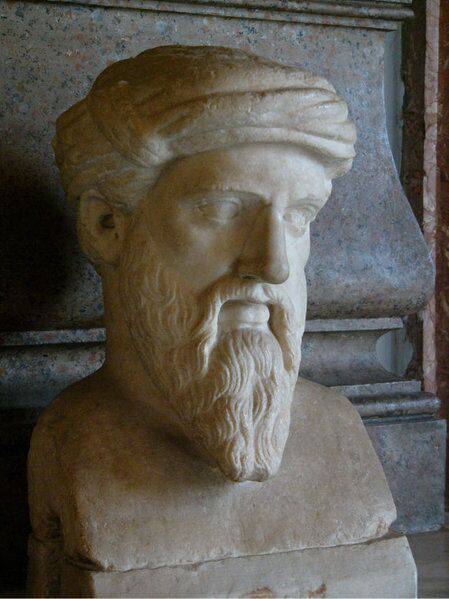
FAQ About Pythagoras

Who was Pythagoras?
Pythagoras was an ancient Greek philosopher and mathematician born around 570 BCE on the island of Samos. He is best known for his contributions to mathematics, especially the Pythagorean theorem, which relates to right triangles. Pythagoras founded a religious movement known as Pythagoreanism, which combined aspects of mathematics, philosophy, and spirituality.

What is Pythagoras famous for?
Pythagoras is most famous for the Pythagorean theorem, a fundamental principle in geometry that describes the relationship between the sides of a right triangle. The theorem states: in a right-angled triangle, the square of the hypotenuse is equal to the sum of the squares of the other two sides. Aside from this, he contributed to musical theory, numerology, and had various philosophical ideas.

What is the Pythagorean theorem?
The Pythagorean theorem is a mathematical principle that applies to right triangles. It states that the square of the hypotenuse (the side opposite the right angle) is equal to the sum of the squares of the other two sides. This can be expressed with the formula: a² + b² = c², where c represents the hypotenuse.

Did Pythagoras invent the Pythagorean theorem?
Although the Pythagorean theorem is named after Pythagoras, historical evidence suggests that knowledge of the theorem predates Pythagoras, particularly in Babylonian mathematics. Pythagoras is credited with formalizing the theorem within the circle of Pythagorean followers, and his school provided proofs and expanded upon its implications.

What was Pythagoreanism?
Pythagoreanism was a philosophical and religious movement founded by Pythagoras. It focused on the belief that numbers and mathematical relationships hold spiritual significance. Pythagoreanism emphasized principles like harmony, virtue, and the immortality of the soul, promoting a way of life that was both intellectual and ascetic.

How did Pythagoras influence mathematics?
Pythagoras influenced mathematics through his study of numbers, geometrical shapes, and ratios. His work laid foundational ideas for later mathematical developments, particularly in geometry and number theory. Pythagorean concepts of mathematical relationships in music also influenced the fields of acoustics and sound theory.

What are some interesting facts about Pythagoras?
Pythagoras established a unique school, where his followers adhered to strict rules, including communal living and dietary restrictions. He believed in the transmigration of souls, which implies that the soul undergoes reincarnation. Intriguingly, it's believed by some historians that Pythagoras prohibited the eating of beans among his followers, possibly due to spiritual beliefs.

Where did Pythagoras live and work?
Pythagoras was born on the island of Samos in Greece, but he later traveled and settled in Croton, a Greek colony in southern Italy. There, he founded a school that became influential in the field of mathematics and philosophy.

Why is Pythagoras often associated with musical theory?
Pythagoras is associated with musical theory due to his research on the ratios of musical intervals based on string lengths. He discovered that harmonious sounds can be produced by vibrating strings whose lengths are simple numerical ratios to each other, impacting both music and acoustic theory, and laying the groundwork for mathematical approaches to music.

How did Pythagoras die?
The exact circumstances of Pythagoras's death are not clearly documented, leading to various legends and conflicting accounts. Some stories suggest that he died around 495 BCE in Metapontum, Italy, possibly as a result of political unrest, while others indicate he may have sought refuge there after his school was attacked.

What role did Pythagoras play in ancient Greek philosophy?
Pythagoras played a significant role in ancient Greek philosophy by introducing ideas related to mathematics as a means to understand and explain the universe. His philosophies influenced Plato and later philosophers, shaping the development of Western thought by integrating elements of spiritual and existential inquiry with scientific exploration.

What were Pythagoras's beliefs about numbers?
Pythagoras and his followers believed that numbers are fundamental to understanding reality. They viewed mathematics as the key to unraveling the cosmos's mysteries, with all things having numerical relationships. This belief in the spiritual significance of numbers extended to music, astronomy, and even ethics.

Are there any writings directly attributed to Pythagoras?
No writings directly attributed to Pythagoras exist today, as he and his followers didn't leave any known written records. The knowledge of his teachings comes through later philosophers such as Plato and Aristotle, as well as from scattered historical accounts by other ancient authors.

How did Pythagorean ideas influence later generations?
Pythagorean ideas profoundly influenced later generations by laying groundwork for philosophical, mathematical, and scientific inquiry. The emphasis on numerical relationships informed the development of geometry and contributed to various fields such as astronomy and musical theory. Philosophers like Plato were notably inspired by Pythagorean thought.

What is the significance of the symbol the 'Tetractys' in Pythagoreanism?
The Tetractys is a triangular figure composed of ten points arranged in four rows. It held mystical significance for the Pythagoreans, symbolizing harmony and the organization of the cosmos. The Tetractys represented the combination of numbers that form the universe's structure and was treated with reverence in Pythagorean rituals.

Was Pythagoras involved in politics?
Pythagoras was involved in politics primarily through the influence of his philosophical teachings, as he founded a semi-religious community with social and political dimensions. His followers, known as Pythagoreans, held significant power in Croton, influencing local governance until political upheaval led to the group's downfall.

Is there evidence of Pythagoras's travels beyond Greece?
There are reports suggesting Pythagoras traveled to Egypt and Babylon, potentially acquiring knowledge from these regions that informed his mathematical and philosophical ideas. While historical evidence for these travels is sparse, such accounts are consistent with the sharing of knowledge across cultures during his era.

What were the key practices in the school founded by Pythagoras?
Pythagoras's school emphasized rigorous ethical and spiritual practices intertwined with mathematical study. Members practiced communal living and vegetarian diets, focusing on self-discipline, studying mathematics, philosophy, music, and astronomy as pathways to understanding universal truths.

Did Pythagoras have any known students?
Pythagoras had several known followers, though none are prominently distinguished in history beyond promoting Pythagorean thought. His disciples spread Pythagoreanism's influence, including figures like Philolaus and Archytas, who contributed to later developments in philosophy and science.

Why is Pythagoras considered a mystical figure?
Pythagoras is considered a mystical figure because of his integration of spiritual beliefs with mathematical and philosophical doctrines. His ideas about the soul, reincarnation, and the universe's order imbued his teachings with mystical qualities that resonated with religious elements of his time, making him a symbol of ancient wisdom.
